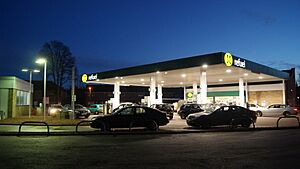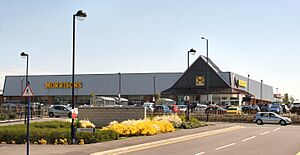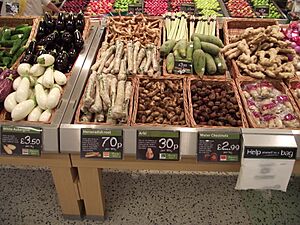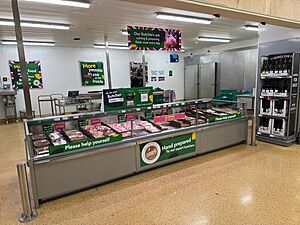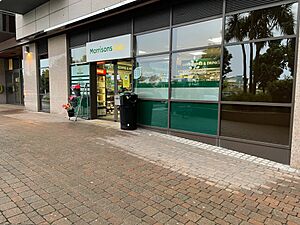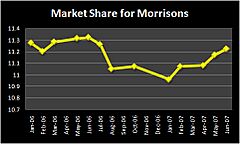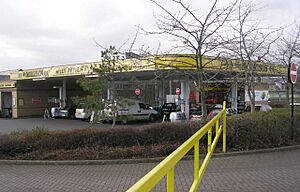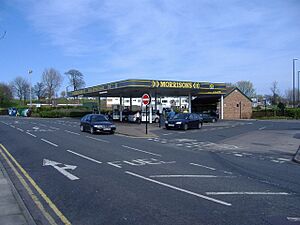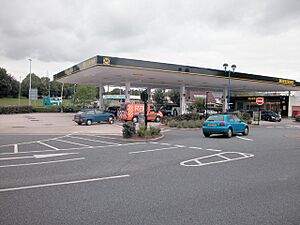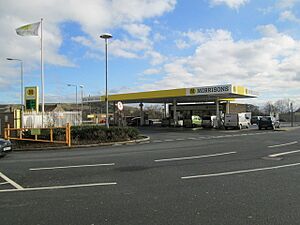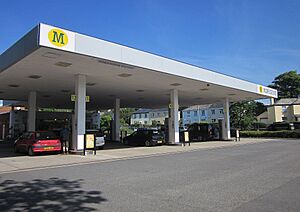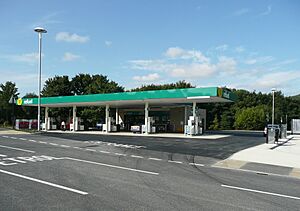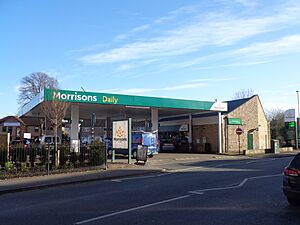Morrisons facts for kids
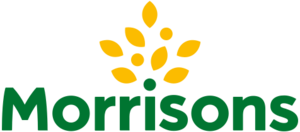
Logo used since 2015
|
|
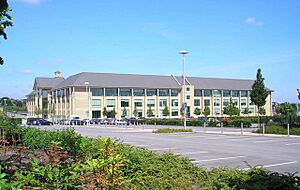
Hilmore House in Bradford, Morrisons' head office
|
|
|
Trade name
|
Morrisons |
|---|---|
|
Formerly
|
|
| Private | |
| Traded as | LSE: MRW FTSE 100 component (until 2021) |
| Industry | Retail |
| Founded | 1899 |
| Founder | William Morrison |
| Headquarters | Bradford, England |
|
Key people
|
Rami Baitiéh (CEO) |
| Products |
|
| Brands |
|
| Revenue | |
|
Operating income
|
|
| Owner | Clayton, Dubilier & Rice |
|
Number of employees
|
110,000 (2021) |
| Subsidiaries | Motor Fuel Group (20%) |
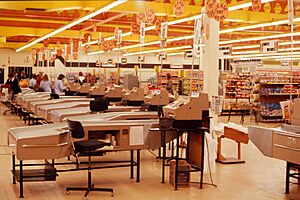
Morrisons is one of the biggest supermarket chains in the United Kingdom. It is the fifth largest, meaning there are four other supermarket chains that are bigger. In 2021, Morrisons had 497 supermarkets across England, Wales, and Scotland, plus one in Gibraltar. The company's main office is in Bradford, England.
Morrisons was started in 1899 by William Morrison. He began by selling eggs and butter from a stall in Rawson Market, Bradford. For many years, most of its stores were in the northern part of England. However, in 2004, Morrisons bought another supermarket chain called Safeway. This helped Morrisons open many more stores in the south of England, Wales, and Scotland. In February 2021, Morrisons had 110,000 employees and served about 11 million customers every week.
Morrisons was once listed on the London Stock Exchange, which meant its shares could be bought and sold by the public. But in October 2021, a private company called Clayton, Dubilier & Rice (CD&R) bought Morrisons. After this, Morrisons faced some financial challenges. By September 2022, Morrisons was the fifth largest supermarket in the UK by market share, with 8.6% of the market. It was overtaken by Aldi for fourth place.
Contents
How Morrisons Started and Grew
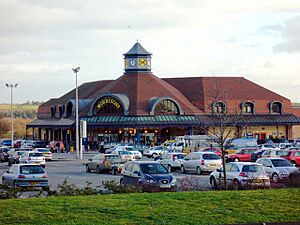
Early Days of Morrisons
The company began in June 1899 as Wm Morrison Limited. William Morrison started his business selling eggs and butter in Rawson Market, Bradford, England.
His son, Ken Morrison, took over the company in 1952 when he was 21 years old. In 1958, Morrisons opened a small shop in the city centre. This was special because it was the first self-service store in Bradford. It was also the first store to put prices on its products and had three checkouts. Morrisons opened its first large supermarket, called "Victoria," in Bradford in 1961.
In 1967, Morrisons became a public company, meaning its shares could be traded on the London Stock Exchange.
Buying Safeway Stores
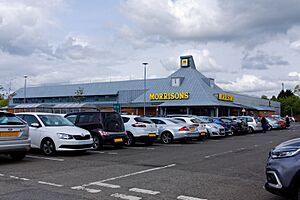
In March 2004, Morrisons bought Safeway, another British supermarket chain. Safeway had 479 stores, which helped Morrisons grow a lot, especially in southern England. Morrisons paid £3.3 billion for Safeway. This deal meant that Safeway shareholders received shares in Morrisons and some cash.
The process of changing Safeway stores into Morrisons stores was a huge task. It was one of the biggest changes in British retail history. Morrisons focused on converting the larger Safeway stores first. Within a few weeks, Safeway shopping bags were replaced with Morrisons bags, and Morrisons' own-brand products started appearing in Safeway stores.
After the takeover, Morrisons had to sell 52 of the Safeway stores to other companies to avoid having too much control over the market. For example, Waitrose bought 19 stores, J Sainsbury plc bought 14, and Tesco bought 10. Morrisons also sold 114 smaller Safeway stores to Somerfield in 2004.
In 2004, the first Morrisons store in Scotland opened in Kilmarnock. Morrisons also sold Safeway stores in Northern Ireland and the Channel Islands. The store in Gibraltar was kept and later updated to the full Morrisons style.
In September 2005, Morrisons closed some former Safeway warehouses, which led to job losses. The process of converting all Safeway stores to Morrisons was finished by November 2005.
Changes in Leadership
After buying Safeway, Morrisons faced some challenges. The company realized that its "northern" way of doing business didn't work as well in the south. To help with this, Morrisons hired Marc Bolland from Heineken to be its new Chief Executive.
On March 13, 2008, Sir Ken Morrison, who had led the company for 55 years, retired as chairman. He was given the title of Honorary President.
Growing the Business and New Ideas
When the Co-operative Group bought Somerfield in March 2009, they had to sell some stores. Morrisons bought 35 of these stores, which were mostly Somerfield shops. This was part of Morrisons' plan to open more than 100 smaller supermarkets. Their goal was to have a store within 15 minutes of every home in the UK.
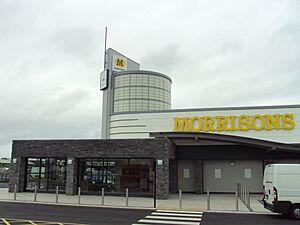
Marc Bolland left Morrisons in December 2009 to become the CEO of Marks & Spencer. Dalton Philips took over as Chief Executive in January 2010.
In 2010, Morrisons started working with the clothing retailer Peacocks. They opened small Peacocks sections inside some Morrisons stores. Later, Morrisons launched its own children's clothing brand called 'Nutmeg' in many of its stores.
The first Morrisons M Local store, which was a smaller convenience store, opened in Ilkley, Yorkshire, in 2011. These M Local stores were later sold and renamed "My Local" in 2015, but that chain didn't last long.
In May 2013, Morrisons partnered with Ocado. This partnership helped Morrisons start its own online shopping service, allowing customers to order groceries from home.
Making Changes and Selling Parts of the Business
In February 2014, some members of the Morrison family, who still owned a part of the company, were not happy with how the company was doing. They thought the company's strategy needed to change.
After Morrisons announced a new plan in March 2014 to improve sales, Sir Ken Morrison, the former chairman, criticized the new approach. In June 2014, Morrisons announced plans to cut 2,600 jobs by changing its management structure. They also said they would create new jobs in their smaller convenience stores and new supermarkets. Morrisons also sold one of its distribution centres in Kent.
After a drop in sales during Christmas 2014, the chairman, Sir Ian Gibson, left early. Andrew Higginson took his place in January 2015. In February 2015, David Potts became the new chief executive. Several other executives also left the company.
Morrisons also decided to close ten stores that were not making enough money. They also slowed down the opening of new convenience stores.
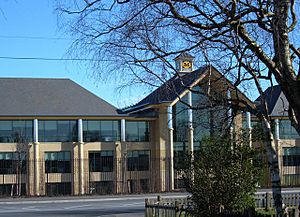
In June 2015, Morrisons lowered the prices of 200 everyday items. The company also decided to make its main office in Bradford simpler, which led to 720 job cuts.
In September 2015, Morrisons sold its 140 M Local stores for £25 million. These stores were renamed My Local. Morrisons also announced plans to close 11 supermarkets, which meant about 900 jobs would be lost. In January 2016, seven more stores were closed.
In November 2015, Morrisons started selling a special milk called 'For Farmers'. They said that an extra 23p from each bottle would go to farmers. However, it was later found that most of this extra money went to the milk supplier, not directly to UK farmers. Morrisons changed the scheme in 2017 so that the extra payment went directly to a group of British farmers.
In March 2020, Morrisons planned to cut 3,000 management jobs and create 7,000 new jobs on the shop floor.
In December 2020, Morrisons faced criticism for keeping Paula Vennells on its board. She had been the CEO of the Post Office during a big scandal. Vennells left her role at Morrisons in April 2021.
In August 2021, there was a protest against Morrisons about how some chickens were raised on farms that supplied the supermarket. Campaigners asked Morrisons to sign the Better Chicken Commitment, which would ban fast-growing breeds and give birds more space and natural light. Morrisons said they cared about animal welfare and would investigate.
In May 2025, after footage showed pig abuse at a farm supplying Morrisons, the supermarket stopped buying from that farm.
CD&R Takes Over Morrisons
In June 2021, Morrisons turned down a £5.5 billion offer to be bought by a private company called Clayton, Dubilier & Rice (CD&R). Morrisons felt the offer was too low.
In July 2021, another company, Fortress Investment Group, made a higher offer of £6.3 billion, which Morrisons' board accepted. However, in August 2021, CD&R made an even higher offer of £7 billion. Morrisons' board then recommended the CD&R offer instead.
In October 2021, the £7 billion CD&R offer was accepted, and the takeover was approved.
In May 2022, Morrisons bought McColl's, a chain of convenience stores. All McColl's stores are now being changed into Morrisons Daily stores.
By February 2023, about 16 months after CD&R bought Morrisons, reports said the company was facing more financial difficulties. Morrisons' profits had dropped, and its debt had increased significantly. Unlike other UK supermarkets, Morrisons makes more than half of its own products, including meat and vegetables. Some people in the industry thought Morrisons might sell off these parts of its business.
On November 6, 2023, Rami Baitiéh became the new Chief Executive of Morrisons, replacing David Potts.
How Morrisons Earns Money
Morrisons' financial results show how much money the company makes and spends. Here's a look at some of their recent results:
| Year ending | Sales (£m) |
Profit/(loss) (£m) | |
|---|---|---|---|
| Before tax | After tax | ||
| 30 October 2022 | 18,479 | (33.0) | (25.0) |
| 2 February 2020 | 17,536 | 408.0 | 348.0 |
| 3 February 2019 | 17,735 | 320.0 | 244.0 |
| 4 February 2018 | 17,262 | 380.0 | 311.0 |
| 29 January 2017 | 16,317 | 325.0 | 305.0 |
| 31 January 2016 | 16,122 | 217.0 | 222.0 |
How Morrisons Operates Today
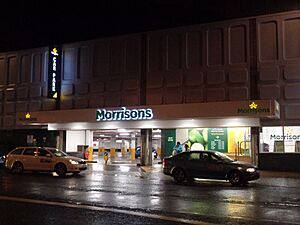
In July 2020, Morrisons had 497 large supermarkets in the UK. Before 2004, most of these were in the middle and north of England. But after buying Safeway, they expanded more into the south.
In April 2021, Morrisons announced it would start using paper bags instead of plastic bags to help reduce plastic waste.
Inside Morrisons Stores
Most large Morrisons supermarkets have a special area called Market Street. Here, you can find fresh produce. Packaged meat is usually near a butcher's counter. There's also a deli counter with cheese and a rotisserie counter called Oven Fresh where you can buy hot, cooked food.
Smaller Morrisons Daily Stores
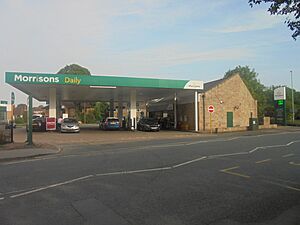
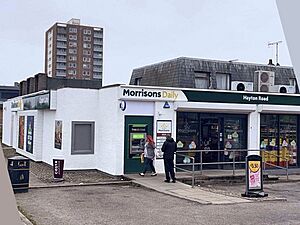
After their earlier M Local stores didn't work out, Morrisons tried again with smaller convenience stores in 2016. These were called Morrisons Daily and were often located at petrol stations. They partnered with companies like Motor Fuel Group and Rontec.
In 2018, Morrisons made a deal with SandpiperCI to open 43 Morrisons Daily stores in the Channel Islands. By 2022, many of these stores had been converted.
In 2021, Morrisons and McColl's agreed to change 300 McColl's convenience stores into Morrisons Daily stores. Morrisons also supplies products to over 1,200 McColl's stores. By September 2024, all McColl's stores had been converted to Morrisons Daily.
Morrisons also brought back the Safeway brand in 2016. This brand is now used for products sold in stores that are wholesale customers of Morrisons, and in some Morrisons Daily stores.
Shopping Online
In 2012, Morrisons launched its first online shop called "Morrisons Cellar," which sold wine.
For many years, Morrisons did not offer online grocery shopping like its competitors. But in May 2013, Morrisons partnered with Ocado to use their technology and delivery system to start its own online grocery service. Morrisons also made a deal with Amazon to supply products for their Prime Pantry service.
Morrisons' share of the UK supermarket market has slowly gone down since 2019. In January 2025, it was 8.6%. This put them behind Tesco (28.5%), Sainsbury's (15.9%), Asda (12.6%), and Aldi (10.2%). They were still ahead of Lidl (7.2%).
In 2006, Morrisons was the most popular supermarket in 10 specific postcode areas in the UK. Half of these were in Yorkshire, where the company started.
Making Their Own Products
Morrisons is unique because it makes more than half of the products it sells itself. This includes things like meat from their own abattoirs (places where animals are prepared for meat), vegetables from their packing houses, and fish from their processing plants. This means they control a lot of their supply chain.
Home Delivery Service
Morrisons now offers a home delivery service, just like most other UK supermarkets.
In June 2020, during the early part of the COVID-19 pandemic in the United Kingdom, Morrisons started a special home delivery program. This allowed elderly and vulnerable people to order groceries by phone if they lived within 10 miles of a Morrisons shop. This "Doorstep Delivery" service continued even after the pandemic rules were lifted.
Morrisons Petrol Stations
Morrisons operates 339 petrol stations across the UK as of 2022. They sell Petrol and Diesel, and some also sell LPG Autogas. Most of these petrol stations are in the car parks of Morrisons stores, but some are standalone stations under the Morrisons Daily or Morrisons Select names.
Over the years, Morrisons petrol stations have changed their look and colours several times:
| Petrol station branding | Colour scheme | Example image(s) | Years introduced | Notes/Comments |
|---|---|---|---|---|
| Miles Better Value | Black text on yellow | Before 1998 | These colours stayed on some stations until 2008. | |
| Yellow text on black v1 | ||||
| Yellow text on black v2 | 1998 — 2007 | |||
| Yellow with green text on white | 2007–2011 | These colours stayed on some stations until 2020. | ||
| Grey with green text on white | ||||
| M Refuel | White text on green | 2011–2016 | ||
| Morrisons Daily / Select | White and yellow text on green | 2016 — present |
Fuel Loyalty Programs
Until 2014, Morrisons petrol stations had a loyalty card called the Miles card. Customers earned points for buying fuel and could get a £5 shopping voucher if they bought a lot of fuel. This was replaced by the Match & More card in 2014, then the More card in 2016, and My Morrisons in 2021. In 2023, it was rebranded again as Morrisons More. With this card, customers earn points that can be turned into money off their shopping.
Past Businesses of Morrisons
Kiddicare Stores
In 2011, Morrisons bought a children's retailer called Kiddicare for £70 million. They hoped to learn how to sell clothing and home goods online from this company. In 2012, Morrisons bought 10 former Best Buy stores to open Kiddicare retail shops. However, Morrisons sold Kiddicare in July 2014 for much less than they paid for it.
FreshDirect Investment
Morrisons bought a small part (10%) of an online grocery company in New York called FreshDirect in 2011. Morrisons sent a team to learn from FreshDirect before starting its own home delivery service in the UK in 2014. In March 2014, Morrisons decided to sell its share in FreshDirect because of financial difficulties and because they had set up their own online shopping site. The sale was completed in August 2016.
Former Convenience Stores
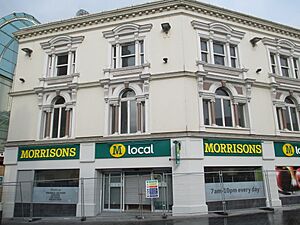
Morrisons used to run smaller stores called "Morrisons M Local" in cities like Birmingham, Manchester, and Bristol. These stores were similar to small Tesco Express or Sainsbury's Local shops. They offered a wider range of hot food, like pastries and rotisserie chicken, and a salad bar. Food was supplied from nearby larger Morrisons stores, and customers could also order fresh meat and fish.
Morrisons opened about 70 M Local stores by the end of 2013. They even bought some former Jessops and Blockbuster stores to convert into M Local shops. However, the M Local chain was sold to a private company in 2015 and renamed My Local, but it closed down less than a year later.
Morrisons' Look and Slogans
Logos and Slogans Over Time
On March 15, 2007, Morrisons introduced a "more modern brand image." This new look was rolled out to all stores, delivery trucks, and warehouses. The main 'Morrisons' name and colours stayed the same, but the old 'M' logo was replaced. Their cheaper own-brand products, once called Bettabuy, were changed to Morrisons Value, and then to M Savers in January 2012.
The old yellow and black logo was replaced. The slogan 'More Reasons To Shop at Morrisons' was changed to 'Fresh Choice For You'. In 2010, this became 'Eat Fresh. Pay Less'. Then in 2013, it changed again to 'More Of What Matters'. These changes also included new signs outside stores, new product packaging, new staff uniforms, and new designs on delivery vehicles. The goal was to attract more customers across the country after Morrisons had expanded by buying Safeway.
In 2015, Morrisons launched a new logo and the slogan 'Morrisons Makes It'. This was to highlight the company's history of making many of its own products. The new logo was put on all store signs, and staff received new uniforms.
In May 2023, Morrisons brought back its old slogan and jingle: 'More Reasons to Shop at Morrisons'.
Loyalty Card Programs
The Match & More card, launched in 2014, helped customers save money. If a customer spent £15 or more and could have paid less for similar groceries at Aldi, Lidl, Tesco, Sainsbury's, or Asda, Morrisons would give them the difference in points on their card. For every 1p difference, customers got 10 points.
In 2016, the Match & More cards were rebranded as the "More" loyalty card. All customers received a new card. The loyalty program was changed again in May 2021 to "My Morrisons," and the points collection feature was removed. However, the Morrisons More loyalty scheme, which brought back the points system, was reintroduced on May 22, 2023.
Morrisons' Own Products
Morrisons sells thousands of products under its own brands. One of these is Morrisons Savers, which used to be called M Savers. This is an economy brand that includes items from food and drinks to toiletries. In 2015, it was the fastest-growing grocery brand in the UK.
Tommy's Afternoon Tea Box
On September 2, 2020, Morrisons launched a special 'Tommy's Afternoon Tea Box'. This box was created to help shoppers celebrate the end of World War Two. For every box sold, £1 went to the Tommy Tea initiative through the Royal British Legion Industries (RBLI), a charity that helps veterans. Morrisons also gave an extra £10,000 to the charity.
How Morrisons Delivers Products
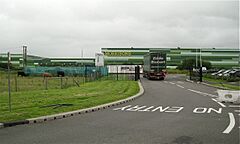
In 2005, Morrisons bought part of Rathbones Bakeries, which used to supply Morrisons with bread.
In 2007, Morrisons opened a new Distribution Centre in Swindon. They also announced that they had bought a new site in Bridgwater, Somerset, to build a facility for packing fresh produce.
In 2011, Morrisons opened a large new distribution centre in Bridgwater. This project cost £11 million and created 1,200 new jobs. After this new centre opened, the Swindon depot was no longer needed and closed in December 2011.
Morrisons has detailed rules for its farms and suppliers, including how animals should be cared for. In 2025, Morrisons promised to meet new standards for shrimp welfare by 2027, working with its suppliers.
See also
- List of supermarket chains in the United Kingdom
- McColl's
- Mainstop
 | Roy Wilkins |
 | John Lewis |
 | Linda Carol Brown |


